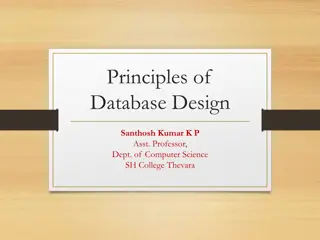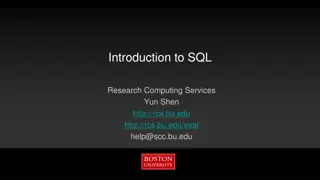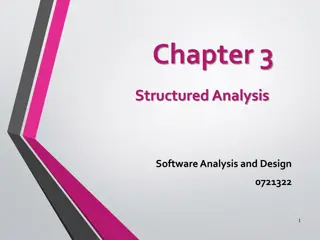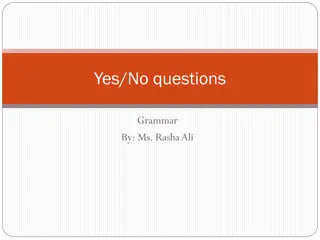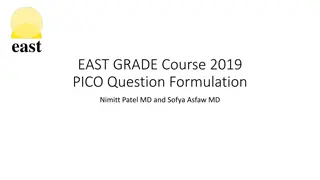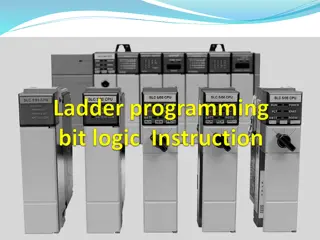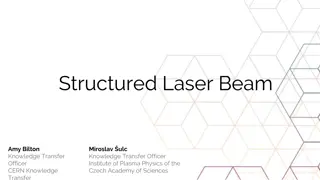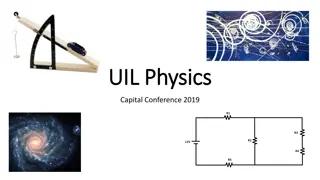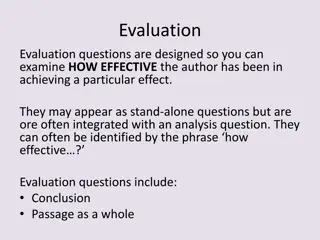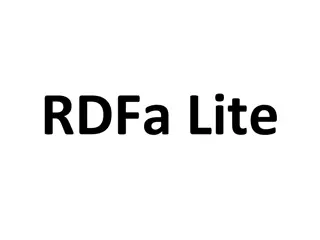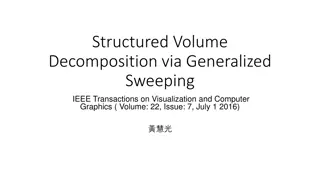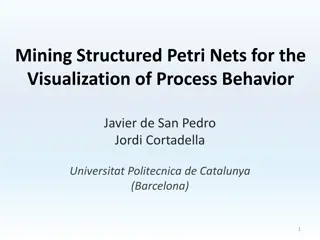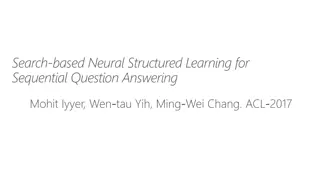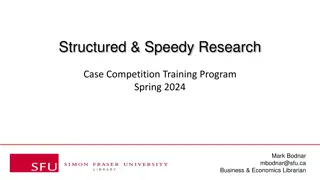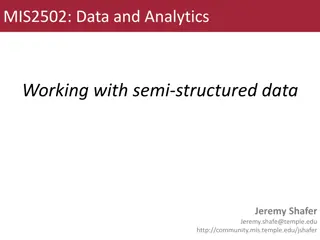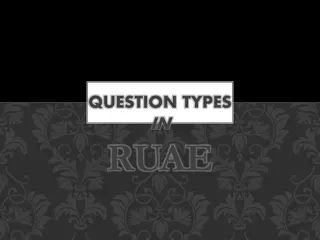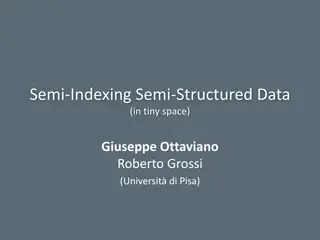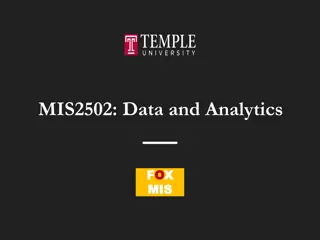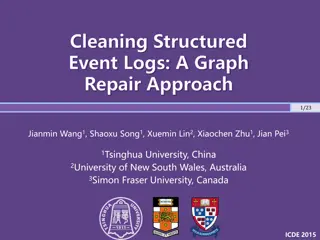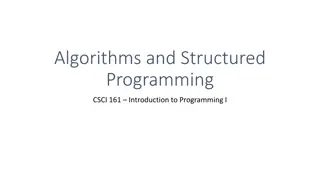Spider Feasibility: A Structured Approach to Quality Improvement
Polypharmacy among seniors is a prevalent issue with potentially harmful consequences. The SPIDER approach, focusing on medication appropriateness through evidence-based quality improvement initiatives, aims to address this challenge. Utilizing a structured process informed by data, evidence, and re
1 views • 15 slides
Essential Guidelines for Effective Report Writing
Well-structured reports define, analyze, and evaluate subjects, presenting findings clearly with recommendations, following specific preparation steps and a structured format including the main body and executive summary.
0 views • 13 slides
Enhancing Learning Through a Structured Cycle
Engage students in activities that connect previous knowledge, share lesson structures effectively, present new information using diverse strategies, enable application of knowledge, and assess retention to enhance learning outcomes. Utilize a structured learning cycle to reinforce concepts and prom
0 views • 8 slides
Objective Structured Clinical Examination (OSCE): A Modern Approach to Assessing Clinical Competence
The Objective Structured Clinical Examination (OSCE) is a modern examination method widely used in the field of health science to evaluate clinical skill performance. It involves stations where medical students interact with simulated patients to demonstrate competencies such as history taking, phys
1 views • 40 slides
Database Design Principles and Management Overview
This document presents an overview of database design principles, including structured, semi-structured, and unstructured data types. It delves into the role of Database Management Systems (DBMS) in defining, constructing, manipulating, and sharing databases effectively. It also covers various types
0 views • 47 slides
Structured Cabling and Installation Overview
Structured cabling involves designing and installing a system to support various hardware needs efficiently. This lecture covers the importance, standards, and types of cables used, such as twisted pair cables and coaxial cables. Learn about copper cables, Ethernet technology, and shielded vs. unshi
0 views • 25 slides
Learn SQL Basics: History, Syntax, and Terminology
SQL (Structured Query Language) is a specialized domain-specific language for managing structured data in relational databases. Developed in the 1970s, it follows a rigid syntax and structure, with specific features like triggers and stored procedures. Understanding SQL history, terminology, and syn
1 views • 38 slides
Principles of Structured Response Table-top Exercise
A table-top exercise is a facilitated discussion that simulates an emergency situation, allowing teams to review current processes and test response principles in a stress-free environment. This session aims to identify areas for improvement in responding to deteriorating patients through structured
0 views • 23 slides
Structured Analysis in Software Design
Structured analysis in software design aims to describe customer requirements, create a basis for software design, and define validatable requirements. Two main modeling philosophies, structured analysis, and object-oriented analysis are discussed. Structured Analysis Model Elements such as Data Flo
1 views • 44 slides
Yes/No Questions in English Grammar
Yes/No questions in English grammar are essential for communication. These questions have two basic types - Yes/No questions and Wh-questions. Yes/No questions, also known as closed questions, have only two possible responses - Yes or No. To form a Yes/No question, verbs like BE, DO, HAVE, or modal
0 views • 9 slides
PICO Question Formulation in Health Care: A Practical Guide
Framing a clear and focused health care question is essential for effective decision-making. The PICO framework - Population, Intervention, Comparison, Outcome - provides a structured approach to formulating questions that lead to actionable recommendations. Guidelines for framing questions based on
3 views • 12 slides
Introduction to Structured Text in PLC Programming
Structured text is a high-level text language used in PLC programming to implement complex procedures not easily expressed with graphical languages. It involves logical operations, ladder diagrams, and efficient control logic for industrial automation. Concepts such as sensor input, logic operation
5 views • 23 slides
Enhancing Language Skills Through Wh-Questions Workshop
This workshop focuses on developing language skills through the use of wh-questions. Participants engage in pair work, individual activities, and a presentation to practice asking and answering personal questions. The session includes activities such as writing personal questions, answering question
1 views • 8 slides
Effective Strategies for Academic Writing Excellence
Academic writing for honours requires concise, structured writing supported by evidence from reputable sources. Key tips include organizing points logically, using structured paragraphs, formal language, and avoiding abbreviations. Writing in full words, avoiding personal pronouns, and maintaining f
1 views • 10 slides
Structured Cabling and Installation Lecture: Tools, Design, and Labeling Guidelines
Explore the world of structured cabling and installation with a focus on design tools, PVC layout, cable labeling, rack components, and backbone cable design. Learn about creating cable layouts, rack configurations, and preparing Bills of Quantities (BoQ) based on typical floor designs. Dive into ex
2 views • 17 slides
Innovative Structured Laser Beam Technology for Improved Beam Propagation
An overview of a novel structured laser beam (SLB) system designed for long-distance propagation with low divergence and a small central spot size. This cost-effective method allows for easy adjustment of beam parameters and offers advantages such as self-reconstruction after obstacles, compact spot
0 views • 9 slides
UIL Physics Capital Conference 2019 Topics & Questions Overview
The UIL Physics Capital Conference 2019 featured various physics topics and questions ranging from teaching quantum physics to dogs to fields like astronomy, measurement, uniform motion, forces, energy, and more. The event covered a wide array of physics concepts, and the directed study text focused
1 views • 25 slides
Analysis of Evaluation and Conclusion Questions in Textual Analysis
Evaluation and Conclusion questions play a crucial role in assessing the effectiveness of an author in achieving specific effects and summarizing key points in a passage. These types of questions are commonly found in textual analysis tasks to evaluate the success of conveying ideas and themes. Eval
0 views • 9 slides
Advancements in Knowledge Graph Question Answering for Materials Science
Investigating natural language interfaces for querying structured MOF data stored in a knowledge graph, this project focuses on developing strategies using NLP to translate NL questions to KG queries. The MOF-KG integrates datasets, enabling query, computation, and reasoning for deriving new knowled
2 views • 13 slides
RDFa Lite: A Simplified Approach to Structured Data Markup
RDFa 1.1 Lite is a subset of RDFa 1.1 that simplifies structured data markup by employing attributes like vocab, typeof, property, resource, and prefix. It works seamlessly with schema.org terms, enabling easy integration of structured data into web content. The comparison of RDFa Lite with Microdat
2 views • 7 slides
Structured Volume Decomposition via Generalized Sweeping
This paper introduces a new technique for generating a simple and predictable structured hex-mesh, providing better convergence properties and more space efficiency in computer graphics and engineering applications. The method involves computing 3D harmonic function decomposition, slicing the object
0 views • 30 slides
Visualization of Process Behavior Using Structured Petri Nets
Explore the concept of mining structured Petri nets for visualizing process behavior, distinguishing between overfitting and underfitting models, and proposing a method to extract structured slices from event logs. The approach involves constructing LTS from logs, synthesizing Petri nets, and presen
0 views • 26 slides
Insights into Structured Reporting Practices in Colorectal Cancer Imaging
A survey conducted by Dr. Eric Loveday at North Bristol NHS Trust revealed the current landscape of structured reporting in MRI and CT scans for rectal and colon cancer. Results indicate a positive outlook towards implementing national standards for structured radiology reporting, with an emphasis o
0 views • 7 slides
Dynamic Semantic Parser Approach for Sequential Question Answering
Using a Dynamic Semantic Parser approach, the research focuses on Sequential Question Answering (SQA) by structuring queries based on semantic parses of tables as single-table databases. The goal is to generate structured queries for questions by defining formal query languages and actions for trans
0 views • 23 slides
Different Types of Questions and Short Answers in English Grammar
This content covers various question forms in English grammar, including general questions, special questions, alternative questions, tag questions, direct and indirect questions, yes-no questions, and short answers. It explains the structure and usage of each type of question with helpful examples
7 views • 24 slides
Structured & Speedy Research Case Competition Training Program - Spring 2024
Join the structured and speedy research case competition training program led by Mark Bodnar, a Business & Economics Librarian at SFU. Enhance your research skills and critical thinking abilities to excel in the upcoming program. Explore the importance of intuition, creativity, and secondary researc
0 views • 9 slides
Methods for Asking Critical Questions and Analysis Techniques
Explore various methods for asking critical questions such as open questions, closed questions, SWOT analysis, Paulo Freire's four open questions, the "But Why?" method, and the Five W's and an H technique. Each method encourages critical thinking and reflection to analyze situations effectively.
1 views • 7 slides
Mastering the Art of Crafting Effective Survey Questions
Crafting good survey questions is essential for gathering accurate and meaningful data. Dr. Amy Moffat, PhD, provides valuable insights on key characteristics of survey questionnaires, best practices for asking survey questions, and how to avoid common pitfalls like double-barreled and biased questi
0 views • 16 slides
Analyzing Failed Information Seeking Questions in Social Q&A Services
The research focuses on unsuccessful information seeking questions in social Q&A platforms, aiming to understand why some questions fail and proposing ways to improve the structure to enhance successful answers. Utilizing data collection methods via the Yahoo! Search API, the study identifies and an
0 views • 21 slides
Semi-Structured Data in Data Analytics
Exploring the world of semi-structured data, we delve into its significance in data analysis. From relational databases to CSV files and Excel spreadsheets, learn about the various forms of data storage and organization. Discover the role of quotation marks, differences between structured, semi-stru
0 views • 19 slides
Energy-Efficient Illumination and Imaging Techniques for Structured Light Applications
This presentation at ACM SIGGRAPH 2015 by Utkarsh Sinha and Jenna Lake explores the use of homogeneous codes to optimize energy efficiency in structured light applications. The focus is on distinguishing between translucency and inter-reflections, removing artifacts, reconstructing 3D objects in cha
0 views • 34 slides
Different Types of Questions in Reading Comprehension
Explore various question types in reading comprehension such as understanding questions, own words questions, analysis questions, evaluation questions, and how to effectively handle each type. Images illustrate examples and explanations for better comprehension.
0 views • 17 slides
All You Need to Know About Interview Procedures
Interviewing candidates is a crucial process in selecting the right employees, reducing turnover, and enhancing profitability. Different types of interviews such as selection, appraisal, and exit interviews serve specific purposes. The interviews can be structured or unstructured, and questions can
0 views • 20 slides
Mastering Competency-Based Interview Questions
Enhance your interview skills by learning how to craft strong responses to competency-based questions using a structured format. Explore tips, strategies, and examples to excel in your next job interview. Utilize tools like Unifrog to prepare and practice for common competency questions effectively.
0 views • 9 slides
Semi-Indexing Semi-Structured Data in Tiny Space by Giuseppe Ottaviano and Roberto Grossi
This article discusses the concept of semi-indexing for semi-structured data in limited space, presented by Giuseppe Ottaviano and Roberto Grossi from the University of Pisa. The study explores efficient data organization techniques to optimize storage and access for structured information.
0 views • 19 slides
Data Structures and Formats in Analytics
Explore the various types of data structures, including structured, semi-structured, and unstructured data. Learn the role of relational databases and how data is stored differently. Delve into the significance of semi-structured and unstructured data in modern organizations.
0 views • 20 slides
AP US History Exam Details and Strategies
Get ready for the AP US History exam with a breakdown of the test structure, key historical skills, thematic areas, and scoring rubrics. Learn how to approach multiple-choice questions, short answer questions (SAQs), document-based questions (DBQs), and long essay questions effectively. Explore the
0 views • 14 slides
Mastering Tag Questions in English Grammar
Dive into the world of tag questions with this detailed lesson plan focused on helping learners understand and use tag questions effectively. Explore the concept, learn the mechanics, and practice creating tag questions for different scenarios. Enhance your English speaking skills and boost your con
0 views • 15 slides
Cleaning Structured Event Logs: A Graph Repair Approach
This paper explores a graph repair approach for cleaning structured event logs, focusing on structured event data, process specification, and conformance checking. It discusses motivations, algorithms, experiments, and conclusions related to the topic. The study analyzes event traces from informatio
0 views • 23 slides
Introduction to Algorithms and Structured Programming
This content introduces algorithms, structured programming, and the importance of structuring tasks to avoid redundancy. It demonstrates how algorithms can be organized, refined, and made more efficient. The examples provided highlight the significance of following a structured approach in problem-s
0 views • 28 slides




